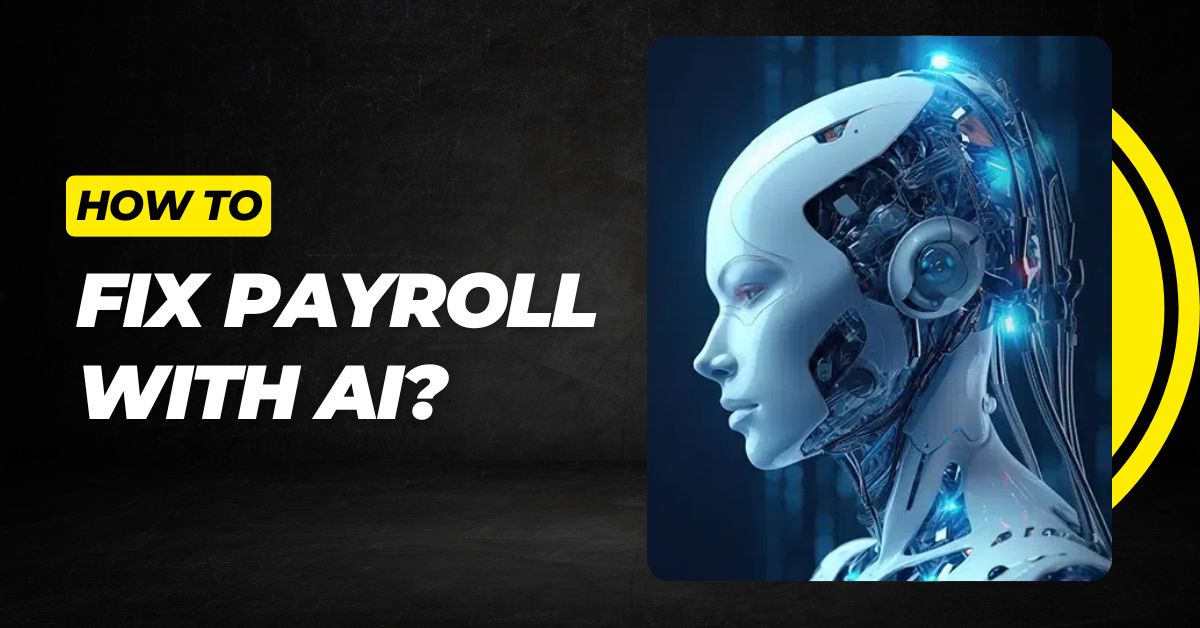How to Fix Payroll with AI?
Managing payroll is one of the most important yet difficult tasks for any business. Payroll means paying your employees correctly and on time, and handling all the taxes, deductions, and reports that come with it. Even small mistakes in payroll can cause big problems, like unhappy workers, tax penalties, and legal troubles. Artificial Intelligence (AI) is changing the way companies manage payroll. AI makes the process faster, easier, and more accurate. If you’ve heard of AI but are unsure how it can help with payroll, this blog is for you.
Why Payroll Needs Fixing
Here are some of the common problems companies face with traditional payroll methods:
- Errors in calculation: Manual entries often lead to wrong salaries or deductions.
- Late payments: Processing delays may cause employees to get paid late.
- Tax compliance issues: Tax rules change often. Keeping up is hard, and mistakes can lead to fines.
- Data management issues: Large amounts of data need to be stored, protected, and updated regularly.
- Time-consuming process: Payroll processing takes a lot of time every month, especially without automation.
These problems not only waste time and money, but also reduce employee trust and satisfaction.
How AI Can Fix Payroll Problems
Let’s look at how AI can help solve these payroll issues:
1. Automating Calculations
AI systems can automatically calculate pay based on working hours, overtime, bonuses, and deductions. You only need to set the rules once. After that, the system keeps applying them. This reduces human error and saves time.
2. Tracking Attendance & Time
AI can connect with time-tracking systems to read attendance data. It can detect patterns like absences, late logins, or extra hours. This helps calculate accurate pay and avoid overpaying or underpaying employees.
3. Tax Compliance & Updates
AI tools can update themselves with the latest tax laws and deduction rules. This keeps your payroll system in line with government regulations. You don’t have to worry about missing changes or paying fines.
4. Error Detection & Alerts
AI systems are smart enough to find errors. If something looks unusual—like a sudden jump in salary or missing data—it sends alerts. This helps you correct mistakes before they become serious.
5. Handling Queries with Chatbots
Some AI payroll tools come with chatbots. Employees can ask simple questions like “When is payday?” or “How much tax was deducted?” The chatbot answers instantly. This saves HR teams a lot of time.
6. Data Security and Privacy
AI systems are designed to follow strict data privacy rules. Payroll involves sensitive information like salary, bank account, and social security numbers. AI can help keep this data secure using encryption and access control.
7. Predicting Payroll Trends
AI can study past data to predict future costs. For example, it can tell you when overtime usually increases or if payroll costs are rising. This helps with budgeting and business planning.
Comparison of Traditional Payroll vs. AI-Powered Payroll
| Feature | Traditional Payroll | AI-Powered Payroll |
|---|---|---|
| Speed | Slow and manual | Fast and automated |
| Error Rate | High | Very Low |
| Compliance with Tax Laws | Needs manual updates | Automatic updates and checks |
| Data Security | Depends on human effort | Advanced encryption and control |
| Cost | Higher (due to errors/time) | Lower (due to automation) |
| Employee Queries | HR handles it manually | AI chatbots provide instant help |
| Insights & Forecasting | Not available | Available through data analysis |
Benefits of Using AI in Payroll
Here’s a list of clear benefits businesses get when they switch to AI-based payroll:
- Accuracy: Reduces errors in salary calculation and tax deductions.
- Speed: Saves time by processing data automatically.
- Cost-Effective: Lowers administrative costs and avoids legal penalties.
- Scalability: Easily handles more employees as your business grows.
- Better Employee Experience: Ensures timely payments and quick query resolution.
- Data Protection: Keeps payroll data safe and only accessible to authorized users.
Real-World Examples
Many businesses, big and small, are now using AI for payroll:
- Small businesses use cloud-based AI payroll tools like Gusto, QuickBooks, and Rippling.
- Large companies often use customized AI payroll software integrated with their HR systems.
AI is not just for tech giants. Even small businesses can start using affordable tools that bring big results.
How to Start Using AI for Payroll
If you are ready to fix your payroll with AI, here are simple steps to get started:
- Understand your payroll needs: How many employees? What kind of work do they do? Are they full-time, part-time, or freelancers?
- Choose the right AI tool: Look for user-friendly and trusted AI payroll software. Some offer free trials.
- Set up the system: Input employee data, payment rules, and connect with your bank and tax accounts.
- Train your team: Make sure HR or payroll staff know how to use the software.
- Start small: Begin with a small batch of payroll and check results. Then expand to the whole team.
- Stay updated: Keep the software updated and learn about new features.
Common Tools Using AI for Payroll
Here are some popular AI-powered payroll tools:
- Gusto – User-friendly payroll and benefits platform for small businesses.
- QuickBooks Payroll – Works with QuickBooks accounting software and includes AI features.
- ADP – Offers smart payroll solutions for all business sizes.
- Paycom – Combines HR and payroll with AI reporting and automation.
- Rippling – Automates everything from payroll to device management.
These tools come with tutorials and support, so you don’t need to be an expert to use them.
Future of Payroll with AI
The future of payroll is intelligent and automatic. AI will continue to learn and improve. It may soon handle:
- Full salary negotiations
- Automatic budgeting for raises
- Real-time tax changes
- Full integration with employee wellness and benefits tools
Soon, most companies will shift to AI-based payroll. It will become the new normal, just like email replaced fax machines.
Conclusion
Payroll is an important part of every business, but it doesn’t have to be hard. AI can fix most of the common payroll problems like errors, delays, and compliance issues. It makes the process smarter, faster, and more secure. Whether you run a small startup or a big company, switching to AI payroll is a smart move.
Using AI helps you save time, avoid mistakes, and keep employees happy. So, start exploring the right tools and fix your payroll with AI today.
Also Read:
- Does Payroll Fall Under HR or Finance?
- How to Do Payroll for a Construction Company?
- What Happens If a Company Can’t Make Payroll?
- Who Is Responsible If a Payroll Check Bounced?
- How to Reconcile Payroll?
Frequently Asked Questions
How does AI help in payroll processing?
AI helps in payroll by automating the calculation of salaries, taxes, and deductions. It connects with time-tracking systems, updates tax laws, and reduces manual work. It also detects errors early and helps ensure that employees are paid on time without mistakes. This saves time and improves accuracy.
Can small businesses use AI for payroll?
Yes, small businesses can easily use AI tools for payroll. Many AI-based payroll software options are affordable and user-friendly. They help small business owners save time, avoid costly errors, and stay compliant with tax laws without needing a large HR or accounting team.
Is AI in payroll secure for employee data?
AI-based payroll systems are designed with strong security features. They use encryption, two-factor authentication, and access controls to protect sensitive employee information like salary and bank details. These tools follow strict privacy laws and are safer than traditional manual record-keeping.
What are the top AI payroll tools today?
Some of the top AI-powered payroll tools include Gusto, QuickBooks Payroll, ADP, Rippling, and Paycom. These tools are trusted, easy to use, and offer features like automatic tax updates, error detection, and employee self-service portals to answer their payroll-related questions.
What problems can AI fix in payroll systems?
AI can fix many payroll problems like late payments, calculation mistakes, tax errors, and data entry issues. It also improves accuracy, saves time, and helps businesses follow changing labor and tax laws. AI can also provide insights and reports to plan better for the future.


